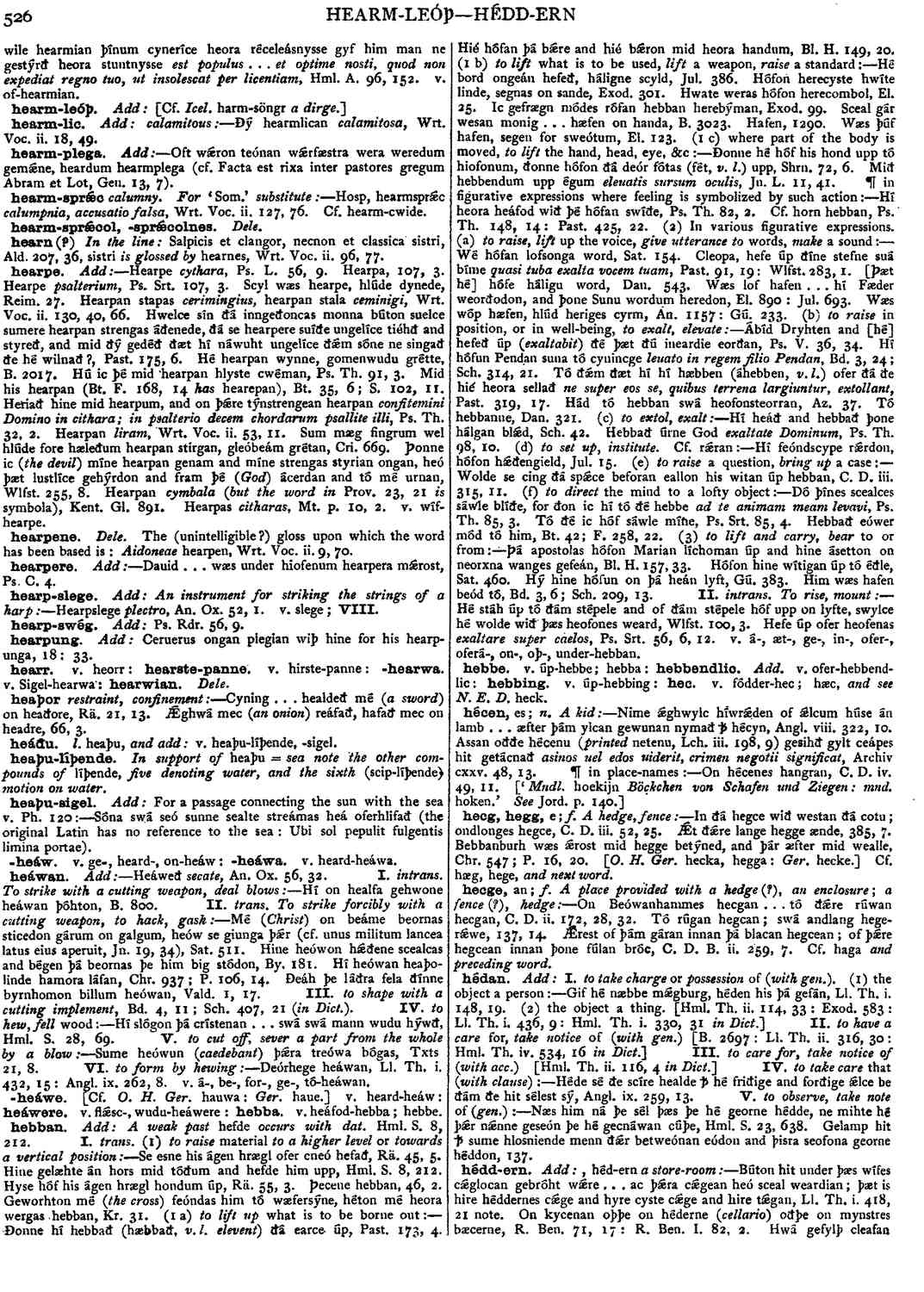hebban
- verb
- Hml. S. 8, 212.
-
Se esne his ágen hrægl ofer cneó hefað,
- Rä. 45, 5.
-
Hine gelæhte án hors mid tóðum and hefde him upp,
- Hml. S. 8, 212 .
-
Hyse hóf his ágen hrægl hondum úp,
- Rä. 55, 3 .
-
Þecene hebban,
- 46, 2.
-
Geworhton mé
(the cross)
feóndas him tó wæfersýne, héton mé heora wergas hebban,
- Kr. 31.
-
Ðonne hí hebbað (hæbbað, v. l. elevent) ðá earce úp,
- Past. 173, 4 .
-
Hié hófan þá bǽre and hié bǽron mid heora handnm,
- Bl. H. 149, 20.
-
Hé bord ongeán hefeð, háligne scyld,
- Jul. 386 .
-
Hófon herecyste hwíte linde, segnas on sande,
- Exod. 301 .
-
Hwate weras hófon herecombol,
- El. 25 .
-
Ic gefrægn módes rófan hebban herebýman,
- Exod. 99 .
-
Sceal gár wesan monig . . . hæfen on handa,
- B. 3023 .
-
Hafen,
- 1290.
-
Wæs þúf hafen, segen for sweótum,
- El. 123.
-
Ðonne hé hóf his hond upp tó hiofonum, ðonne hófon ðá deór fótas (fét, v. l.) upp,
- Shrn. 72, 6 .
-
Mið hebbendum upp égum
eleuatis sursum oculis,
- Jn. L. 11, 41 .
-
Hí heora heáfod wið þé hófan swíðe,
- Ps. Th. 82, 2.
-
Cf. horn hebban,
- Ps. Th. 148, 14 :
- Past. 425, 22 .
-
Wé hófan lofsonga word,
- Sat. 154 .
-
Cleopa, hefe úp ðíne stefne suá bíme
quasi tuba exalta vocem tuam,
- Past. 91, 19 :
- Wlfst. 283, 1 .
-
[Þæt hé] hófe háligu word,
- Dan. 543.
-
Wæs lof hafen . . . hí Fæder weorðodon, and þone Sunu wordum heredon,
- El. 890 :
- Jul. 693 .
-
Wæs wóp hæfen, hlúd heriges cyrm,
- Án. 1157 :
- Gú. 233 .
-
Ábíd Dryhten and [hé] hefeð úp
(exaltabit)
ðé þæt ðú ineardie eorðan,
- Ps. V. 36, 34 .
-
Hí hófun Pendan suna tó cynincge
leuato in regem filio Pendan,
- Bd. 3, 24 ;
- Sch. 314, 21 .
-
Tó ðǽm ðæt hí hí hæbben (áhebben, v. l.) ofer ðá ðe hié heora sellað
ne super eos se, quibus terrena largiuntur, extollant,
- Past. 319, 17 .
-
Hád tó hebban swá heofonsteorran,
- Az. 37 .
-
Tó hebbanne,
- Dan. 321 .
-
Hí heað and hebbað þone hálgan blǽd,
- Sch. 42 .
-
Hebbað úrne God
exaltate Dominum,
- Ps. Th. 98, 10 .
-
Hí feóndscype rǽrdon, hófon hǽðengield,
- Jul. 15 .
-
Wolde se cing ðá spǽce beforan eallon his witan úp hebban,
- C. D. iii. 315 II. ,
-
Dó þínes scealces sáwle blíðe, for ðon ic hí tó ðé hebbe
ad te animam meam levavi,
- Ps. Th. 85, 3 .
-
Tó ðé ic hóf sáwle míne,
- Ps. Srt. 85, 4 .
-
Hebbað eówer mód tó him,
- Bt. 42 ;
- F. 258, 22 .
-
Þá apostolas hófon Marian líchoman úp and hine ásetton on neorxna wanges gefeán,
- Bl. H. 157, 33 .
-
Hófon hine wítigan úp tó éðle,
- Sat. 460 .
-
Hý hine hófun on þá heán lyft,
- Gú. 383 .
-
Him wæs hafen beód tó,
- Bd. 3, 6 ;
- Sch. 209, 13 .
-
Hé stah úp tó ðam stépele and of ðam stépele hóf upp on lyfte, swylce hé wolde wið þæs heofones weard,
- Wlfst. 100, 3.
-
Hefe úp ofer heofenas
exaltare super caelos,
- Ps. Srt. 56, 6, 12 .
Bosworth, Joseph. “hebban.” In An Anglo-Saxon Dictionary Online, edited by Thomas Northcote Toller, Christ Sean, and Ondřej Tichy. Prague: Faculty of Arts, Charles University, 2014. https://bosworthtoller.com/52115.
Checked: 1